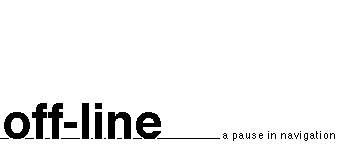It has been reported that the Catholic Church may be
considering the appointment of a patron saint of the
internet; and that he could be Saint Isidore of Seville. An
interesting choice. According to the
Catholic
Encyclopedia «he was the first Christian writer to essay
the task of compiling a summa of universal knowledge».
His work «epitomized all learning, ancient as well as
modern» and «imparted a new impetus to encyclopedic
writing, which bore abundant fruit in the subsequent centuries.»
Quite fit for a protector and inspirer of the internet.
There are some interesting coincidences. Campaigns
against the internet, in which it’s described as sinful and
diabolical, are often followed by Church statements to the
contrary. Though we have yet so see any of the Catholics who
actively took part in those campaigns admit their mistakes
and recite an appropriate mea culpa.
That’s a widespread habit – regardless of religion or
philosophical inclination. Nobody is ever wrong, nobody
admits mistakes. Infallibility is not only the privilege of
prophets following divine inspiration. It’s also shared by
business pundits, stock analysts, economists and journalists,
who seem to have lost the ability to admit mistakes – or
learn from them.
Mistakes are useful if they are used as a learning tool.
But that is rarely done. That very big (and rather stupid)
mistakes were made is pretty obvious. But now everyone is
blaming everyone else. The media blame the analysts, the
analysts blame the media, both blame “the public”;
they say «that was what people wanted to hear».
In other words... are people stupid? Or was the public poorly
informed by those who were supposed to provide advice and guidance?
We’ve been flooded with statistics and projections that were
totally meaningless but preached as gospel. Nobody has a decent
explanation of how those figures were put together and why they were
so far removed from reality. More importantly – nobody seems
to have a clue about how to avoid such blunders from now on.
Millions (billions) were spent on business plans that
didn’t deserve a penny. In the United States there were
bankruptcies – and some CEOs resigned. In my country some
business units are being closed with as little noise as
possible (and no explanation.) Jobs are being cut but nobody
admits to be downsizing. Expenses are being cut across the
board (sacrificing potentially good ventures while some
hopeless ones are still receiving more support than they
deserve.) But the incompetent managers are hanging on to
their jobs (and their large salaries.) Nobody admits mistakes.
If things went wrong the blame is on the “market”
that didn’t understand, on competitors warping the environment,
or on a “technology gap” for which nobody has a clear
definition or diagnosis. Or on the government – that did unwisely
support some large and poorly conceived ventures, but did not
run to the rescue of all the failures.
Many of my friends and readers are quite outspoken and
ironic. I can hear them ask: «when did you make
mistakes?» Several times, my dear friends. Such as when
I bought software that I didn’t need – or when I became so
skeptical that I didn’t install some that may be useful. Or
when, over a year ago, after so many public admissions of how
poorly the business and political establishment had
understood new technologies and new communication systems, I
expected to see a change in attitudes and a shift to more
common sense – that so far hasn’t happened.
Errare humanum. More importantly, making mistakes is
useful. One of the qualities of the internet is that it’s a
very good testing ground – to try, experiment, and learn from
mistakes. But to do that we must know how to listen and
learn. Two qualities that are missing in the hasty and
arrogant leaders of most businesses today – especially, but
not only, in the so-called “new economy”. They
think they can teach, preach and manage without learning.
When the consequences of their mistakes become too obvious to
be ignored... they put the blame on someone or something else.
Or they just sit there waiting for some saint patron to bail them out.
Is the game over? Not yet. More high-rise buildings with
poor foundations will have to crumble before a simple truth
prevails. Many mistakes were made and more will happen.
That’s unavoidable. But if we want to see more reliable
developments we need a culture in which errors are admitted –
and corrected before it’s too late. The most dangerous people
are those who think they are infallible.



